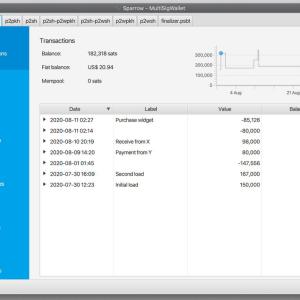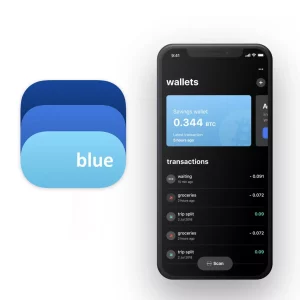Replace-by-fee (RBF) (or Bump Fee) is a feature of some Bitcoin wallets that allows you to replace a low-fee transaction with a new one with a higher fee. This is done by creating a new transaction with a higher fee and the same inputs as the original transaction, but with a higher fee rate, and miners will prioritize it over the original transaction because it has a higher fee rate.
RBF can be useful in situations where you have sent a transaction with a low fee, and it is taking a long time to confirm. By using RBF, you can increase the fee and speed up the confirmation time.
How to Use RBF
When you send a Bitcoin transaction, it is broadcast to the network and placed in the mempool, where it waits to be confirmed by a miner. The transaction fee paid by you determines how quickly the transaction will be confirmed. If the fee paid by you is too low, the transaction may take a long time to confirm, especially during times of high network congestion.
To use RBF, you must enable the feature in your RBF-compatible Bitcoin wallet before sending a transaction. When you send a transaction with RBF enabled, the wallet will include a flag in the transaction that indicates that it can be replaced by a transaction with a higher fee. You can then create a new transaction with a higher fee and broadcast it to the network. When the miners see the new transaction with the higher fee, they will prioritize it over the original transaction because it has a higher fee rate.
Benefits of RBF
RBF or Bitcoin bump fee is a feature of Bitcoin transactions that provides several benefits to you. One of the most significant benefits of RBF is that it allows you to increase the speed of your time-sensitive transactions by increasing the fee associated with the transaction. When network congestion is high, transactions can take longer than usual to confirm. However, with RBF, you can adjust the fee amount associated with your transactions to ensure that they are confirmed in a timely manner.
In addition to increasing transaction speed, Bitcoin bump fee also provides you with more flexibility and control over your transactions. If you realize you have set an inadequate fee or forgot to include a fee altogether, you can use RBF to adjust the fee amount and ensure that your transaction is confirmed as quickly as possible.
Another benefit of RBF is that it can help you avoid stuck transactions. When a transaction is stuck in the mempool due to low fees, it can take hours or even days to confirm. In certain cases, a transaction may get entirely removed from the mempool, resulting in the funds being returned to the sender. However, with RBF, you can replace your low-fee transaction with a higher fee one, which can help avoid transactions getting stuck in the mempool.
Find out more: What’s the mempool?
Finally, RBF can potentially save you money on transaction fees. By setting lower fees initially and then increasing them only if necessary, you can potentially reduce the overall cost of your transactions. These benefits make Bitcoin bump fee a valuable feature for you if you want more control over your bitcoin transactions and faster confirmation times.
RBF vs Full RBF
Both RBF (or Opt-in RBF) and Full RBF are functionalities related to transaction fees in the Bitcoin network. They allow users to speed up unconfirmed transactions by replacing them with a new one that offers a higher fee to miners. However, there’s a key difference in how they operate.
RBF is the most widely used form of RBF today. It requires the original transaction to explicitly signal that it can be replaced. This is done by setting a specific value in the transaction data. Wallets need to specifically support this feature for it to work. Therefore, wallets that support RBF will typically handle this automatically.
Full Replace-By-Fee (Full RBF) extends the functionality of RBF by allowing the replacement of not only the fee but also other transaction details, such as the recipient address or the amount being sent. This means that users can not only increase the fee but also modify other parameters of the transaction if needed.
Full RBF provides you with even greater flexibility in managing your transactions, as you can make adjustments to correct errors or accommodate changing circumstances even after the transaction has been broadcasted. However, it’s essential to note that not all Bitcoin wallets support Full RBF, as it introduces potential risks, such as the possibility of a double spend if used improperly.
Differences Between RBF and CPFP
RBF (Replace-by-Fee) and CPFP (Child Pays for Parent) are two different techniques used in Bitcoin transactions to deal with stuck transactions due to low transaction fees, but they differ in who initiates the process and how the fees are handled.
In the case of RBF, only the original sender of the transaction can initiate the process, whereas CPFP can be initiated by anyone, including the sender, recipient, or even a third party. When it comes to fees, RBF involves the sender broadcasting a new transaction with a higher fee, effectively replacing the old one, and the sender pays the new, higher fee. In contrast, CPFP works by having the recipient (or anyone else) create a new transaction that spends the unconfirmed output from the original transaction, also known as the “parent.” This “child” transaction includes a higher fee, incentivizing miners to prioritize both transactions together, and the child transaction pays the higher fee.
Dig Deeper: What is Child-Pays-For-Parent (CPFP)?
Risks of RBF
While RBF can be a powerful tool for speeding up transactions, it’s not without potential pitfalls. One major concern is network congestion. Prioritizing transactions based on fees can lead to low-fee transactions getting stuck in the mempool, creating delays and clogging the network.
Financially, RBF also introduces risks. Setting a higher fee than necessary to expedite a transaction means forfeiting those additional funds to the miner if the original transaction doesn’t go through. This can be particularly costly for users unfamiliar with fee dynamics or during periods of high network activity.
More concerning, RBF raises the dangers of market manipulation. If powerful mining groups collude to prioritize certain transactions, it could artificially inflate or deflate the price of Bitcoin. This practice undermines the market’s natural price discovery mechanisms and risks harming unsuspecting users.
The potential for double-spending remains a concern with RBF. While mitigation strategies exist, the ability to replace a pending transaction with a higher-fee one theoretically opens the door to spending the same coins twice.
Bitcoin Wallets Supporting RBF
Here are some of the popular RBF wallets:
- BlueWallet: a popular RBF Bitcoin wallet with additional advanced features.
- Samourai: a non-custodial open-source wallet for Android with advanced features including RBF.
- Electrum: a desktop Bitcoin wallet that supports RBF as well as other advanced features.
- Mycelium: an open source mobile Bitcoin wallet that supports RBF and is known for its user-friendly interface.
- Exodus: a non-custodial wallet for desktop, mobile, and browser-based applications, which supports RBF Bitcoin transactions.
- Trezor: Trezor is an open source Bitcoin hardware wallet that offers bump fee feature.
- Ledger Live: the official desktop and mobile wallet software for Ledger hardware wallets, which also supports RBF.
- Sparrow is an open source desktop wallet with advanced features such as RBF.
It’s important to note that not all Bitcoin wallets support RBF, so it’s important to check if a wallet supports this feature before relying on it.









































